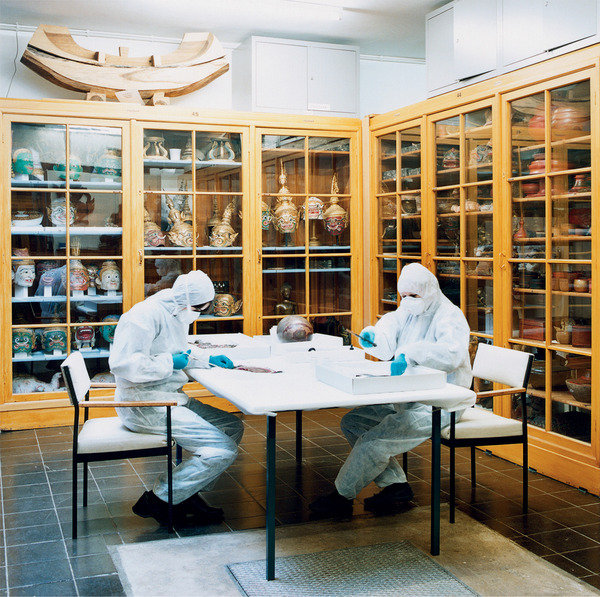Animism - Modernity through the Looking Glass
dal 14/9/2011 al 28/1/2012
Segnalato da
Agency
Marcel Broodthaers
Adam Curtis
Didier Demorcy
Walt Disney
Jimmie Durham
Eric Duvivier
Henri Michaux
Thomas Alva Edison
Leon Ferrari
Walon Green
Victor Grippo
Candida Hofer
Luis Jacob
Ken Jacobs
Joachim Koester
Yayoi Kusama
Len Lye
Chris Marker
Alain Resnais
Daria Martin
Angela Melitopoulos & Maurizio Lazzarato
Ana Mendieta
Vincent Monnikendam
Jean Painlevé
Hans Richter
Roee Rosen
Natascha Sadr Haghighian
Anselm Franke
Sabine Folie
Georgia Holz
14/9/2011
Animism - Modernity through the Looking Glass
Generali Foundation, Wien
The exhibition takes up the current broad-based reassessment of modernity, examining the ethnological conception of animism as it was framed in the context of colonialism as well as the concept of animism in psychoanalysis. The many works featured on the show use a variety of media and heterogeneous strategies to trace lines of demarcation, thresholds, and transitions across the canonical divisions, displacing, exaggerating, and transforming them, suggesting a revision and decolonization of not only our traditional understanding of animism but also the modern imaginary it articulates.

Agency, Marcel Broodthaers, Adam Curtis, Didier Demorcy, Walt Disney, Jimmie Durham, Eric Duvivier/Henri Michaux, Thomas Alva Edison, León Ferrari, Walon Green, Victor Grippo, Candida Höfer, Luis Jacob, Ken Jacobs, Joachim Koester, Yayoi Kusama, Maxim Komar-Myshkin/Roee Rosen, Len Lye, Chris Marker/Alain Resnais, Daria Martin, Angela Melitopoulos/Maurizio Lazzarato, Ana Mendieta, Vincent Monnikendam, Jean Painlevé, Hans Richter, Natascha Sadr Haghighian, Maria Eichhorn, Richard Hamilton, Ann Veronica Janssens, Willem Oorebeek, Karthik Pandian and Mathias Poledna, Joëlle Tuerlinckx, Heimo Zobernig
Animism. Modernity through the Looking Glass takes up the current broad-based reassessment of modernity, examining the ethnological conception of animism as it was framed in the context of colonialism as well as the concept of animism in psychoanalysis. In Vienna, the city of Sigmund Freud, one focus of the exhibition is on aesthetic approaches that subject the distinction between the psychological "inside" world and the material "outside" world to critical scrutiny.
The "old" animism—modernity's vanishing point
By the end of the nineteenth century, animism is defined as a set of superstitious beliefs, as a "projection" and misapprehension of reality in which the "primitive mind" populates the world with souls and spirits, endowing things and nature with life, agency, and subjecthood. At the height of European colonialism, animism becomes the quintessence of civilization's opposite. To be modern meant to leave animism behind and to separate the world in accordance with the dualist divides that have been in effect since Descartes: soul and body, mind and matter.
The "new" animism—a reactivation
In the context of a critique of the dualisms and static categories of modernity, anthropologists have recently begun to reassess animism. Avoiding Western notions of what "life," "soul," "self," "nature," "supernatural forces," or "belief" are, can we understand animism as a practice that revolves around different experiences of the relations between subject and object? In light of current ecological, technological, and biopolitical developments, finding novel ways to rethink the boundaries between nature and culture, between human and non-human (nature, technology), between psyche and outside world, and between life and non-life represents an urgent political challenge.
Scenes of an exhibition—lines of demarcation, thresholds, transitions
The exhibition negotiates these boundaries along aesthetic processes in which the museum, as an objectifying and mummifying apparatus, comes under critical scrutiny as well.
The many works in the exhibition use a variety of media and heterogeneous strategies to trace lines of demarcation, thresholds, and transitions across the canonical divisions, displacing, exaggerating, and transforming them. Animism. Modernity through the Looking Glass suggests a revision and decolonization of not only our traditional understanding of animism but also the modern imaginary it articulates.
Concept: Anselm Franke
Curators: Anselm Franke with Sabine Folie
Animism is a collaboration between: Extra City – Kunsthal Antwerpen, Museum of Contemporary Art Antwerp (M HKA), Kunsthalle Bern, Generali Foundation, Vienna, Haus der Kulturen der Welt, Berlin, and Freie Universität Berlin.
Image: Candida Höfer, "Ethnologisches Museum Berlin III," 2003. Courtesy the artist.
Opening:
15 September 2011, 7 p.m.
Program of events, opening weekend
September 15, 8 p.m.
Performance: The Holy Spirit (after the exhibition opening)
Jimmie Durham, Artist
September 16, 7 p.m.
Lecture (in English)
Groundless in the Museum: Anarchism and the Living Work of Art
Luis Jacob, Artist
Followed by a conversation with Anselm Franke, Curator
September 17, 2011, 4 p.m.
Curatorial Tour Anselm Franke (in German)
Film program accompanying the exhibition
Phantoms. Metamorphoses. Animism in Film
Sunday screenings on 9/18, 10/9, 11/13, 12/4/2011, 1/15, and 1/22/2012, always at 1 p.m.
Filmcasino, Margaretenstr. 78, 1050 Wien / www.filmcasino.at
Curator: Wilbirg Brainin-Donnenberg
An event held by the Generali Foundation and the Filmcasino in collaboration with the Austrian Film Museum (OeFM).
September 18, 2011, 1 p.m. and 3 p.m.
The six-part film series starts with the experimental metamorphoses of Segundo de Chomón, a pioneer of early animation film (with live music by Billy Roisz), and the found-footage artist and master avant-garde filmmaker Martin Arnold (World premiere of Self Control, 2011).
Generali Foundation
Wiedner Hauptstrasse 15 - Vienna
Opening hours:
Tue–Sun, public holidays
11 a.m.–6 p.m., Thu to 8 p.m.
UnDo.Net è un dispositivo di creazione di valore immateriale; pensato come "ecosistema" della cultura contemporanea, come modello partecipativo che sviluppi la condivisione di ricerche, risorse e conoscenze, la collaborazione e lo scambio.
In questi 20 anni UnDo.Net ha perseguito il suo scopo: inventare un nuovo spazio, che prima non esisteva, di sperimentazione e di ricerca, di confronto e di dialogo.
Anche in futuro UnDo.Net rimarra' consultabile e a disposizione di tutti gratuitamente.





